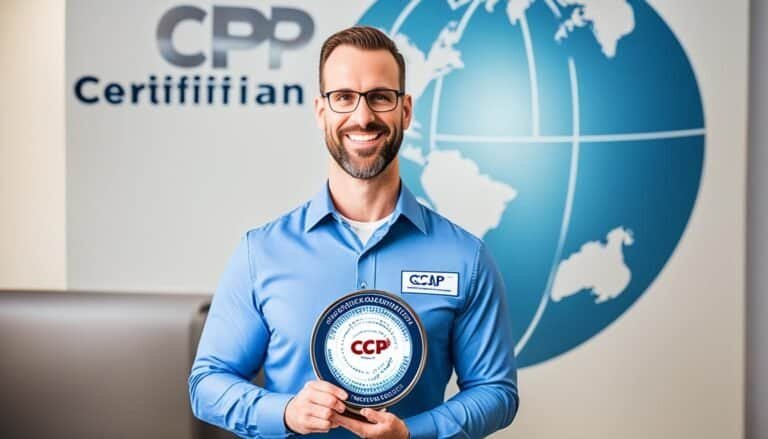Certified Professional Organizer
According to recent surveys, over 80% of Americans feel overwhelmed by clutter and disorganization in their homes. From overflowing closets to cluttered countertops, the chaos can affect our productivity, mental well-being, and overall quality of life. This is where a certified professional organizer comes in.
By utilizing their expertise and knowledge in home organization, these professionals can help you declutter, streamline your space, and create systems that promote a harmonious living environment. Whether you’re looking to tackle a specific room or need assistance with a complete home overhaul, a certified professional organizer can provide the guidance and solutions you need.
If you’re ready to take control of your cluttered home and experience the life-changing benefits of an organized space, keep reading to discover how certified professional organizers can help, the benefits of certification, and what to consider before pursuing this career path.
Key Takeaways:
- Certified professional organizers have the knowledge and skills to transform your home and bring order to chaos.
- Having a clutter-free and organized living space can improve productivity and mental well-being.
- Certification provides credibility and expertise in the organizing industry.
- Clients value professionalism, experience, and results when choosing a professional organizer.
- Consider the pros and cons of certification before pursuing it as a career path.
Organizing Solutions for a Harmonious Home
When it comes to achieving a clutter-free and harmonious home environment, professional home organizers offer valuable solutions. ASPO’s certification courses, such as Simple Systems®: Professional Organizing and Simple Systems®: The Business of Organizing, provide a comprehensive approach to organizing. These courses cover a wide range of topics, including:
- Organizing by rooms and categories: Learn effective strategies for organizing different areas of your home, from bedrooms and kitchens to closets and garages.
- Paring down: Discover techniques for decluttering and getting rid of items you no longer need or use, creating more space and reducing stress.
- Project organizing: Gain insights into managing and completing organizing projects efficiently and effectively.
- Maintenance: Learn how to establish routines and systems for maintaining an organized home on an ongoing basis.
- Creating a business plan: If you aspire to become a professional home organizer, ASPO’s courses also cover essential business aspects, such as developing a solid business plan.
- Branding, marketing, and client acquisition: Understand how to establish a unique brand identity, develop effective marketing strategies, and attract clients.
ASPO’s resources, including clear instructions, templates, and worksheets, are designed to assist you in developing customized organizing solutions for your clients. These materials provide practical guidance and help you streamline your organizing process, ensuring a clutter-free and harmonious living space. With the knowledge and skills gained from ASPO’s certification courses, you’ll be equipped to transform disorganized spaces into functional and visually appealing areas.
Implementing professional organizing techniques and solutions can bring numerous benefits to your home and life. From saving time and reducing stress to enhancing productivity and improving overall well-being, a clutter-free environment can have a profound impact. With the help of a certified professional home organizer, you can establish efficient systems, maximize space utilization, and create an atmosphere that fosters calmness and harmony.
Benefits of Certification for Professional Organizers
Becoming a certified professional organizer can have a significant impact on your career in the organizing industry. Obtaining a professional organizing certification, such as the ones offered by NAPO (National Association of Productivity and Organizing Professionals) or POC (Professional Organizers in Canada), can provide numerous benefits that can help you stand out as an expert in your field.
Here are some of the key benefits of professional organizing certification:
- Showcasing Professionalism and Knowledge: Certification demonstrates your commitment to professionalism and proficiency in organizing principles, techniques, and best practices. It serves as tangible evidence of your expertise and knowledge.
- Enhancing Credibility: Clients value credibility when hiring a professional organizer. Certification adds credibility to your profile by assuring clients that you have undergone a rigorous training process and adhere to industry standards.
- Demonstrating Dedication: By investing time and effort in obtaining a professional organizing certification, you showcase your dedication to your profession. It demonstrates your commitment to ongoing learning and staying updated with the latest organizing trends and techniques.
- Personal Satisfaction: Achieving a professional organizing certification can bring personal fulfillment and a sense of accomplishment. It validates your hard work and dedication to your craft, boosting your confidence as you help clients transform their spaces.
- Positioning as a Trusted Expert: Certification sets you apart as a trusted expert in the field of organizing. It gives potential clients peace of mind, knowing that they are working with a qualified professional who has the expertise to transform their living or working spaces.
While certification may not be a strict requirement for success in the organizing industry, it can significantly contribute to your professional growth and marketability as an organizing consultant.
The Path to Professional Organizer Certification
Becoming a Certified Professional Organizer is an important step toward establishing yourself as an expert in the organizing industry. While the specific requirements may vary depending on the organization you choose, such as NAPO or POC, the general path to certification typically involves the following steps:
- Joining a professional organizing association: Start by becoming a member of a reputable professional organizing association, such as the National Association of Productivity and Organizing Professionals (NAPO) or the Professional Organizers in Canada (POC). This allows you to access valuable resources, networking opportunities, and educational materials.
- Taking recommended classes: Many certification programs require completion of specific courses related to organizing principles, client assessment, hoarding, organizing tools, and more. These classes provide essential knowledge and skills that will form the foundation of your organizing expertise.
- Accumulating organizing hours: To become a certified professional organizer, you will typically need to accumulate a certain number of organizing hours. These hours can be gained through working with clients, participating in volunteer organizing projects, or completing internships under the guidance of experienced organizers.
- Applying and completing a certification test: Once you have fulfilled the association’s requirements, you can apply to take a certification test. This test evaluates your understanding of organizing principles, techniques, and ethical standards. Passing the test demonstrates your competence as a professional organizer.
- Paying an annual maintenance fee: After achieving certification, you will be required to pay an annual maintenance fee to the association. This fee allows you to maintain your status as a certified professional organizer and continue accessing the association’s benefits and resources.
It’s important to note that professional organizer certification typically lasts for five years. To renew your certification, you may need to fulfill ongoing education requirements or undergo retesting to ensure your knowledge and skills are up to date.
Certification provides valuable knowledge and validation, but it’s important to remember that the success of a professional organizer ultimately depends on their skills, expertise, and dedication to helping clients achieve their organizing goals.
| Benefits of Professional Organizer Certification | Considerations for Professional Organizer Certification |
|---|---|
|
|
“Certification is a valuable milestone in a professional organizer’s journey. It showcases expertise, professionalism, and commitment to the industry. However, certification alone does not guarantee success. Clients primarily seek organizers who can deliver exceptional results and create life-changing transformations.” – Sarah Davis, Certified Professional Organizer
Professional Organizer Certificate Courses Online
Are you passionate about organizing and want to turn your skills into a successful career? Online professional organizer certificate courses offer a convenient and flexible way to gain the essential knowledge and expertise needed to excel in the field of organizing. Whether you aspire to work as an organizing consultant or start your own organizing business, these courses provide a comprehensive curriculum that covers various aspects of organizing.
When you enroll in a professional organizer certificate course online, you can expect to learn key principles and techniques that will enhance your ability to create organized and harmonious spaces. From understanding the history of organizing to mastering organizing systems and strategies, these courses offer a holistic approach to help you become a skilled professional organizer.
Some of the topics covered in these courses include:
- The fundamentals of organizing
- Key organizing principles
- Organizing the home and individual rooms
- Organizing for businesses
- Starting an organizing business
- Marketing techniques for organizing services
- Success strategies for professional organizers
By taking online certificate courses, such as the Professional Organizer Certificate Course Online, you’ll benefit from personalized teaching assistance and career advice from industry experts. These courses provide a comprehensive learning experience that equips you with the knowledge and skills needed to thrive as a professional organizer.
Upon completion of an online professional organizer certificate course, you’ll receive a downloadable certificate that showcases your achievement and dedication to the organizing profession. This certificate serves as a testament to your expertise and can be a valuable asset when attracting clients or seeking employment opportunities.
Investing in your education through professional organizer certificate courses online is a strategic step towards building a successful career as an organizing consultant. The comprehensive curriculum, personalized guidance, and industry recognition provided by these courses will empower you to make a meaningful impact on people’s lives by helping them achieve organized and clutter-free spaces.

| Benefits of Online Professional Organizer Certificate Courses |
|---|
| Flexibility to learn at your own pace and schedule |
| Comprehensive curriculum covering essential organizing principles and techniques |
| Personalized teaching assistance and career advice from industry experts |
| Downloadable certificate upon completion for professional recognition |
| Opportunity to start your own organizing business or work as an organizing consultant |
The Value of Certification in the Organizing Industry
The value of certification in the organizing industry can vary depending on the target market and clients. While some clients may specifically seek certified professional organizers for their expertise and credentials, others may prioritize the organizer’s experience, reputation, and testimonials. Certification can contribute to a professional image, establish trust, and potentially attract clients who value certification. However, it’s important to note that certification is not the sole determinant of success, and a dedicated and skilled professional organizer can thrive in the industry without formal certification.
Establishing Professionalism and Trust
Certification in the organizing industry has the potential to enhance professionalism and establish trust with clients. By obtaining a certification, professional organizers demonstrate their commitment to advancing their knowledge and skills in the field. Clients may view certification as a sign of expertise and reliability, which can give organizers a competitive edge in the market. Certification also provides a sense of assurance to clients that the organizer follows industry best practices and adheres to a professional code of conduct.
“Certification in the organizing industry serves as a testament to our dedication to providing high-quality services and maintaining the highest level of professionalism.”
Credibility and Competitive Advantage
Certification can enhance the credibility of professional organizers and differentiate them from non-certified counterparts. Clients seeking professional organizing services often value industry recognition and may prioritize certified organizers in their search. Certification signifies a certain level of expertise and competence, which can instill confidence in clients when making their decision. It can act as a competitive advantage in a saturated market, attracting clients who prioritize the value of certification in their search for a professional organizer.
Client Preferences and Industry Recognition
While certification can hold value within the organizing industry, it’s important to consider client preferences and industry recognition. Some clients may prioritize an organizer’s experience, reputation, and client testimonials over formal certification. The ability to deliver results and establish a connection with clients may have a greater impact on their decision than formal credentials. Each client is unique, and understanding their preferences and needs is vital in providing an exceptional organizing service.
Overall, certification in the organizing industry can contribute to establishing professionalism, enhancing credibility, and attracting clients who value certification. However, it’s essential to recognize that certification is not the sole determinant of success as a professional organizer. Ultimately, a combination of expertise, skills, reputation, and client satisfaction will determine the success of a professional organizing career.
Professional Organizer Certification Costs and Considerations
Obtaining professional organizer certification involves various costs that aspiring organizers should consider. These costs may include:
- Membership fees
- Course fees
- Test registration fees
- Annual maintenance fees
The total cost of certification can vary depending on the chosen organization and the duration of the certification process. For instance, the certification offered by the National Association of Productivity and Organizing Professionals (NAPO) can cost a minimum of $1,074 for the first year. This cost includes membership, classes, test registration, and maintenance fees.
When evaluating the costs, it’s crucial to consider the financial investment alongside the potential benefits and advantages that certification can bring to your professional organizing career.
| Costs | Min. Cost | Max. Cost |
|---|---|---|
| Membership Fees | $200 | $400 |
| Course Fees | $500 | $1,500 |
| Test Registration Fees | $150 | $300 |
| Annual Maintenance Fees | $200 | $500 |
Obtaining certification as a professional organizer requires careful consideration of the associated costs and the potential return on investment. It’s essential to evaluate your financial situation and determine if the benefits of certification align with your career goals and aspirations.
While certification may require a financial commitment, it can provide valuable opportunities for professional growth and advancement in the organizing industry.
The Client Perspective on Certification
In general, clients looking for professional organizing services may not prioritize the certification status of organizers when deciding who to hire. Instead, they rely heavily on recommendations from trusted sources like friends, family, or social media networks. Clients are more concerned with an organizer’s reputation, experience, and track record of delivering successful results. While certification may not be a decisive factor for clients, it does offer certain advantages and considerations for professional organizers.
To gain the trust and confidence of potential clients, professional organizers should focus on effective communication, trust-building, and showcasing their expertise. Instead of relying solely on formal certification, organizers can emphasize their knowledge, competence, and ability to understand and meet the unique organizing needs of each client. Sharing testimonials of satisfied customers and case studies demonstrating successful projects can be more influential to potential clients than formal certification.
“The client’s perspective on certification is often centered around an organizer’s ability to understand their needs, communicate effectively, and deliver tangible results. While certification can offer some assurance, it’s ultimately the organizer’s reputation, experience, and testimonials that matter most.” – Sarah Johnson, Decluttering Specialist
Clients are looking for professional organizing services that can provide practical solutions and help them achieve a clutter-free and well-organized living space. While certification can add value to an organizer’s credentials, it’s essential to prioritize effective communication, trust-building, and demonstrating expertise through real-life success stories.
Next, let’s explore the pros and cons of certification in the organizing industry and help you make an informed decision about pursuing certification.
Weighing the Pros and Cons of Certification
When considering professional organizing certification, it’s important to weigh the pros and cons based on your unique goals, industry recognition, target market preferences, and personal preferences for ongoing education. Certification can provide added credibility, skills enhancement, and potential networking opportunities within the organizing community. However, it also involves financial investment, time commitment, and the ongoing requirements to maintain certification. Ultimately, the decision to pursue certification should align with your professional goals, commitment to ongoing learning, and the specific needs of your target market.
Pros of Professional Organizing Certification:
- Credibility: Certification showcases your professionalism and expertise, enhancing your image as a competent organizer.
- Skills Enhancement: Certification programs offer valuable training and resources to expand your knowledge and improve your organizing skills.
- Networking Opportunities: Becoming certified provides you with access to a community of like-minded professionals, opening doors for collaborations and referrals.
Cons of Professional Organizing Certification:
- Financial Investment: Certification programs typically involve fees for membership, courses, exams, and maintenance, which can be a significant financial commitment.
- Time Commitment: Pursuing certification requires dedicated time for studying, attending courses, and completing certification requirements.
- Ongoing Requirements: Maintaining certification often entails fulfilling continuing education requirements or renewing certification periodically.
While certification can provide valuable benefits, it’s essential to evaluate whether the advantages outweigh the costs and align with your professional goals and target market preferences.
Pros and Cons of Professional Organizing Certification
| Pros | Cons |
|---|---|
| Credibility | Financial Investment |
| Skills Enhancement | Time Commitment |
| Networking Opportunities | Ongoing Requirements |
Conclusion
Becoming a certified professional organizer can offer various benefits to those seeking to establish themselves in the organizing industry. Certification can enhance credibility and showcase expertise, providing a competitive edge in the market. However, it is important to note that certification is not a prerequisite for success in this field.
When choosing a professional organizer, clients primarily value professionalism, experience, and the ability to deliver results. While certification can contribute to these qualities, it is not the sole determinant of a successful career as an organizing consultant.
Whether you choose to pursue certification or not, focusing on continuous learning, building a strong reputation, and delivering exceptional organizing services will ultimately determine the success of your career. Prioritize gaining practical experience, staying updated with industry trends, and continuously improving your skills to meet the evolving needs of your clients.
Remember, while certification can provide valuable knowledge and validation, it is your dedication, expertise, and commitment to your clients’ satisfaction that will allow you to thrive as an organizing consultant.
FAQ
What are the benefits of becoming a Certified Professional Organizer?
Becoming a Certified Professional Organizer can provide the knowledge, confidence, and credentials needed to excel in the field. It enhances credibility, demonstrates dedication to the profession, and can position you as a trusted expert in the industry.
What are some organizing solutions for a clutter-free home?
As a professional home organizer, you can provide organizing solutions such as creating clear systems for organizing by rooms and categories, paring down belongings, project organizing, and maintenance strategies.
Why should I consider getting professional organizing certification?
Professional organizing certification showcases professionalism, enhances credibility, and demonstrates knowledge in the industry. While certification is not a requirement for success, it can set you apart as a competent and qualified organizing consultant.
What is the path to becoming a Certified Professional Organizer?
The path to becoming a Certified Professional Organizer may vary depending on the chosen organization. Generally, it involves joining a professional organizing association, taking recommended classes, accumulating organizing hours, applying and completing a certification test, and paying fees for maintenance and renewal.
Are there online professional organizer certificate courses available?
Yes, there are online professional organizer certificate courses that offer a flexible and accessible way to learn essential organizing principles and techniques. These courses cover topics such as organizing the home, starting an organizing business, marketing techniques, and success strategies.
How important is certification in the organizing industry?
The value of certification in the organizing industry can vary depending on the target market and clients. While some clients may specifically seek certified professional organizers, others may prioritize an organizer’s experience and reputation. Certification can contribute to a professional image and establish trust, but it is not the sole determinant of success.
How much does professional organizer certification cost?
Obtaining professional organizer certification typically incurs costs such as membership fees, course fees, test registration fees, and annual maintenance fees. The total cost can vary depending on the chosen organization and the duration of the certification process.
Do clients prioritize the certification status of professional organizers?
Clients often prioritize an organizer’s reputation, experience, and ability to deliver results over their certification status. Certification may not be a decisive factor if clients perceive the organizer as knowledgeable and competent in helping them with their organizing needs.
What should I consider when weighing the pros and cons of certification?
When considering professional organizing certification, it’s important to weigh the benefits, costs, and ongoing requirements. Certification can enhance credibility, provide skills enhancement, and potential networking opportunities, but it also involves a financial investment and time commitment.
Is certification necessary to succeed as a professional organizer?
Certification is not a prerequisite for success as a professional organizer. Clients primarily value professionalism, experience, and results. Focusing on continuous learning, building a strong reputation, and delivering exceptional organizing services will ultimately determine the success of your career.







